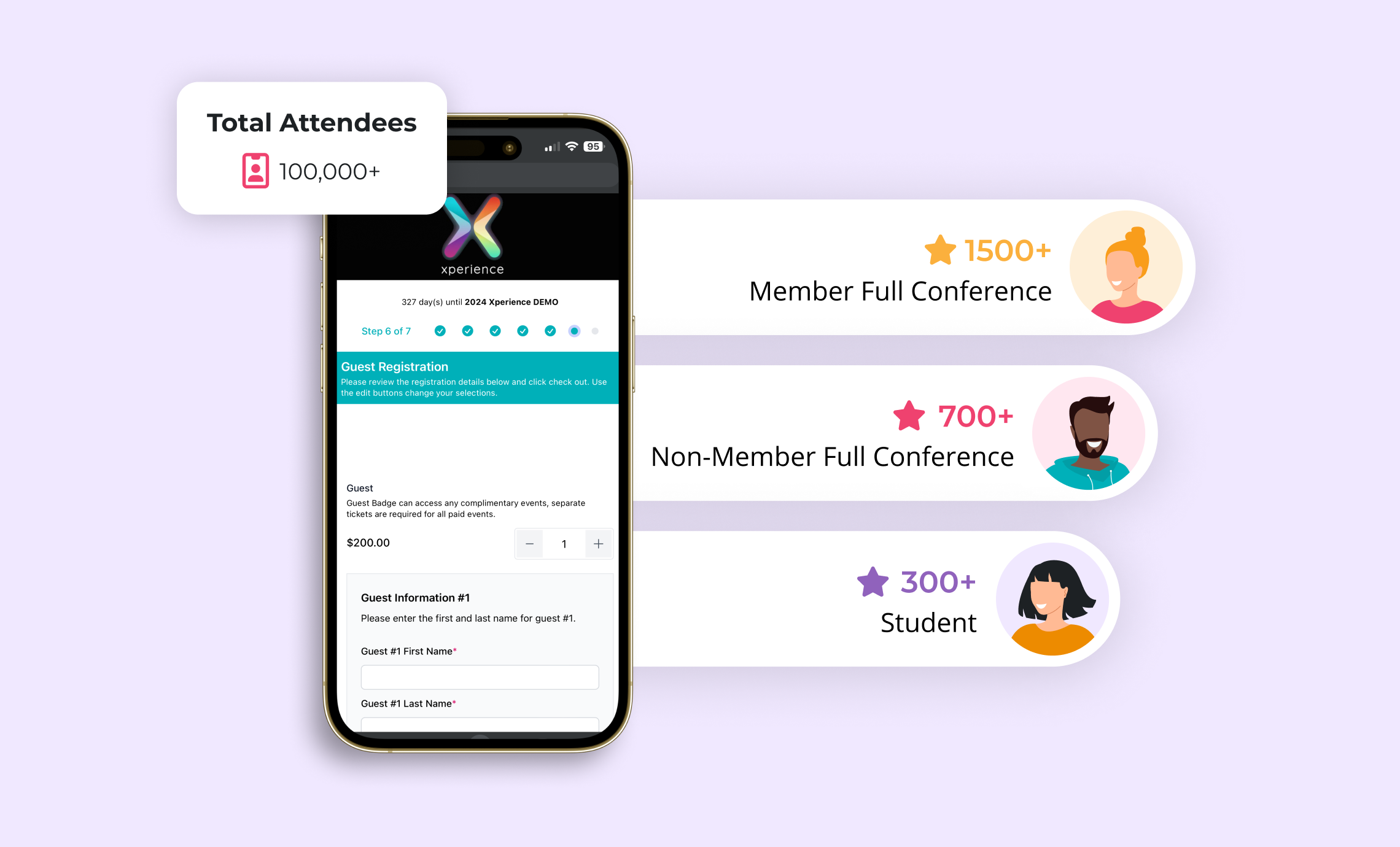Whether it’s a corporate conference, a trade show, a gala, or a fundraiser, creating a seamless experience for your attendees is paramount, but one key aspect that event planners and organizers often underestimate is the event check-in process.
A smooth and efficient check in program can set the tone for the entire event, ensuring your attendees start their experience on the right foot. Let’s discuss the significance of a well-executed event check-in process and provide you with valuable tips to improve it.
Best of all, get to know Expo Logic’s cutting-edge solutions to help you streamline your event check-in process effectively!
Expo Logic’s check-in solutions: Why do efficient event check-ins matter?
Event check-in is the gateway to your event, and a smooth process can lead to positive first impressions and enhanced attendee satisfaction. When attendees experience a hassle-free guest check in, they are more likely to engage with your event content, network with other attendees, and return for future events.
With our expertise in event technology solutions, Expo Logic is here to help you make that first interaction memorable. As a leader in event technology solutions, Expo Logic is renowned for creating effective and efficient check-in processes for events of all sizes. Our innovative solutions streamline the check-in experience, ensuring attendees can register quickly and smoothly, beginning their event journey on a high note.
Understanding the event check-in process
Event check-in is when attendees officially register their presence at your event. It involves verifying attendee information, distributing badges, tickets, or access credentials, and providing necessary event materials. The check-in process can vary in complexity, depending on the event’s size and type, but its significance remains consistent. A well-executed event check-in process is significant because of the following reasons and more:
- First impressions count: As the saying goes, you never get a second chance to make a strong first impression. An easy check-in experience sets a positive tone and makes attendees feel welcome.
- Data accuracy: Accurate attendee data is essential for tracking attendance, personalizing the event experience, and ensuring security.
- Attendee experience: A streamlined check-in process minimizes wait times, reduces attendee frustration, and allows attendees to get to the exciting part of the event quickly, making their overall experience more enjoyable.
- Security and access control: Checking in attendees ensures that only authorized individuals can access your event, enhancing overall security.
- Efficiency and organization: An efficient check-in process keeps your event on schedule, allowing you to maximize the use of your event time and resources.
Despite its importance, the event check-in process can pose various challenges for organizers.
- Long wait times: Slow check-in processes can frustrate attendees, impacting their experience.
- Data errors: Manual data entry can lead to inaccuracies, making tracking attendance and personalizing the experience difficult.
- Resource drain: Inefficient check-in processes can consume valuable time and human resources.
- Lack of insights: Traditional check-in methods often lack real-time insights into attendee data and behavior.
- Scalability issues: Manual check-in processes may become unmanageable as your event grows.
Key tips for streamlining event check-in
Now that we’ve established the significance and challenges of the event check-in process, let’s explore some event check-in tips for streamlining it.
Embrace technology
Incorporating technology into your event check-in process is a game-changer. Digital solutions like event management software, an event check-in app, and an event sign up app offer an automated event check-in system, reducing human error and speeding up the process. A check-in app for events allows attendees to self-check in using QR codes, cutting down queues, making the process smoother for attendees, and also freeing up staff to focus on other event tasks.
These digital tools can also provide real-time insights into attendee movement, allowing for immediate adjustments to improve the event flow. Whether it’s a small local gathering or a large-scale conference, the scalability of tech-based solutions ensures they can accommodate events of any size.
Prioritize pre-registration
Pre-registration is when attendees sign up, provide the necessary information, and receive their entry badges or tickets before the event. This proactive approach enables event organizers to manage the influx of attendees more efficiently as the basic formalities are handled in advance.
Pre-registration helps reduce long queues at the event venue, as pre-registered attendees can bypass the check-in process or go through a fast track, dramatically cutting down the wait times and enhancing the attendee experience right from the start. Secondly, pre-registration allows for accuracy in attendee data as it eliminates the last-minute rush of manual data entry and also gives organizers an early insight into the attendee data, enabling more accurate planning and resource allocation.
Finally, the scalability of pre-registration systems ensures you can efficiently handle a growing number of attendees, making them exceptionally beneficial for larger events.
Implement self-service kiosks
Self-service kiosks are standalone stations allowing attendees to check in and print their event badges or tickets. These kiosks, equipped with intuitive user interfaces, make it easy for attendees to complete the check-in process within minutes, reducing the need for a workforce at the registration desk.
Implementing self-service kiosks at events can significantly streamline the check-in process. Like with pre-registration, kiosks allow attendees to check themselves in quickly, reducing the need for staff involvement. Self-service kiosks are also user-friendly and can print badges or tickets on the spot.
Design an efficient layout
Ideally, the area should be spacious enough to accommodate large crowds and prevent congestion. Clearly marked lanes for different purposes can help guide attendees and facilitate smooth movement. Signage placement is also critical to direct attendees to their respective areas and avoid confusion. In addition, a well-designed layout should incorporate comfortable waiting areas, providing a pleasant environment for attendees if they need to wait.
Leverage real-time insights
With the power of data collected in real-time, event organizers can gain actionable insights into attendee behaviors, such as peak arrival times, and make necessary adjustments on the spot. Additionally, real-time insights can help identify bottlenecks in the check-in process, enabling swift action to mitigate the issue.
Leveraging technology for effortless check-in at your event
Expo Logic is a leader in event technology solutions, offering a range of tools to streamline and enhance your event check-in process. These solutions include:
- Event check-in software: Expo Logic’s event check-in software provides a seamless and efficient check-in experience for organizers and attendees, offering real-time data integration, customizable badge printing, and the flexibility to handle different event types and sizes.
- Onsite technology: Expo Logic’s onsite technology includes self-service kiosks, a check in app for businesses, and reliable hardware for smooth operations.
- Integration: Expo Logic’s solutions seamlessly integrate with your existing event registration systems and databases, ensuring you can access real-time insights and data accuracy.
To illustrate the impact of Expo Logic’s solutions, check out a couple of real-life success stories:
- Badge[On]Demand for the Independent Insurance Agents of Houston (IIAH)
- Badge[On]Demand integration and ExpressPass™ event badge printing services for the Association of American Law Schools
- Self-service kiosks for the National Association of Pediatric Nurse Practitioners
- Badge[On]Demand integration and ExpressPass™ event badge printing services for The National Society of Black Engineers (NSBE)
- ExpressPass™ stations for Entrepreneurs’ Organization (EO)
Best practices for event check-in management
To further enhance your event check-in process, consider implementing the following best practices:
Advanced preparation
Advanced preparation refers to all the tasks and measures event organizers undertake before the event date to ensure a smooth check-in process. This practice includes activities such as pre-testing check-in software and equipment, pre-printing of badges when necessary, planning for contingencies, and any data integration required. Advanced preparation is pivotal for event check-in management because it identifies and rectifies potential issues before they impact the event.
Team coordination and training
Team coordination is the efficient collaboration and communication of event staff to ensure a smooth and seamless check-in process, involving assigning specific roles to each team member, establishing clear lines of communication, and ensuring all team members understand the check-in procedure and their responsibilities.
Conversely, training involves equipping the team with the necessary skills and knowledge to handle the check-in software and equipment effectively. Team members should be well-versed in troubleshooting common issues with check-in apps or kiosks and able to provide quick solutions to avoid delaying check-in.
Both team coordination and training are best practices in event check-in management as they foster a well-prepared and competent team capable of delivering an efficient and pleasant check-in experience for attendees.
Checklist for a seamless check-in process
Create a detailed checklist for the check-in process. Include all necessary equipment, supplies, and staff assignments. For example:
- Technological readiness: Confirm that all technical equipment, such as kiosks, tablets, and printers, is in working order.
- Software preparedness: Ensure all necessary software, including event registration and check-in apps, are installed, updated, and functioning correctly.
- Staff briefing: Conduct a final briefing with the check-in team to review roles, responsibilities, and last-minute changes.
- Attendee list: Have the updated attendees list ready for reference during check-in.
- Signage: Place clear signage directing attendees to the check-in area.
- Emergency contact: Keep the contact details of technical support or emergency services if needed.
- Customer service: Ensure the check-in team is ready to provide excellent customer service, helping attendees with queries or issues.



